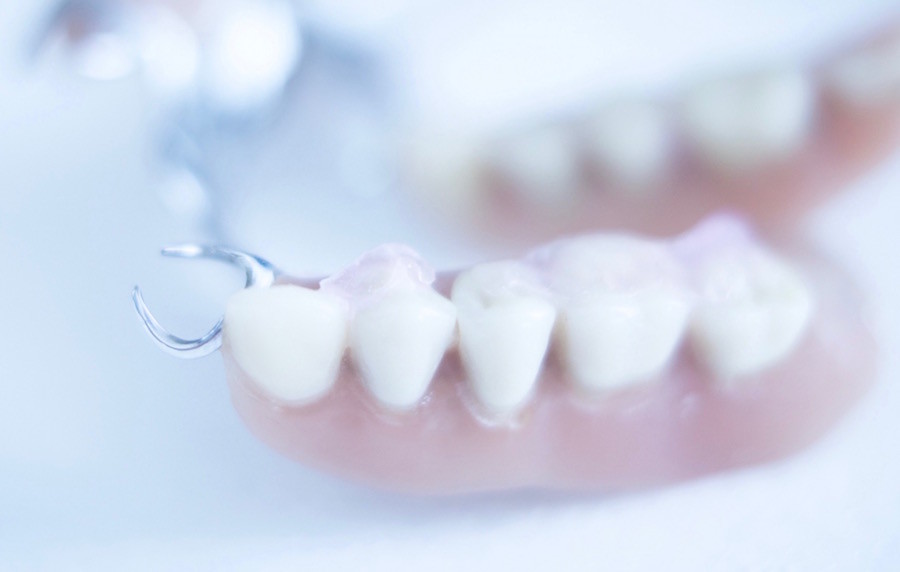
The day has arrived that you thought wouldn’t happen – you need dentures to replace missing teeth. At this point, it doesn’t really matter what led you here, be it missed dental checkups and/or poor oral hygiene, all that counts is that you need to take action before bone loss in your jaw becomes so great that it worsens your appearance, compounding the impact that missing teeth have already had on your inability to smile with confidence. But again, you’re not too keen on going this route, so before you take the cheapest alternative, you want to consider your options. Keep reading.
Four Options to Consider When the Time May Have Come for Dentures
1. Get Dentures
This is often the cheapest option (at first) which is why some people choose dentures, even though to be honest, it is now an antiquated solution for replacing missing teeth. While your current budget is indeed a legitimate consideration, the low cost today may cost you much more in the future. Over time, conventional dentures will fall victim to significant wear and tear and less able to acclimate to the realignment of your jaw, no matter how well they are manufactured. After they become less comfortable and no longer as functional (for chewing, etc.) as they used to be, the time will have come that they need to be repaired, relined, and eventually replaced. Simply put, the longterm cost of “ownership” of dentures is greater than you will have anticipated. That being said, it is worth looking at your options.
Complete dentures are conventional dentures, and is an appliance that is inserted in your mouth to replace your natural teeth while providing support for the cheeks, lips, and jaw (to an extent). Partial dentures, are as they sound, and used to replace one or more missing teeth while restoring your chewing function and preventing existing teeth from spreading out along your gum line. You can learn more about partial dentures here. You may have also heard about immediate dentures, which are also as they sound, a short term solution to keep your appearance and talking/chewing function intact immediately after you’ve had your teeth removed. Immediate dentures will often be used to bridge (no pun intended) the time between your tooth extraction and ultimate solution, which may include the items addressed below. Learn more about immediate dentures here.
2. Implant Supported Overdenture
Overdentures can be a viable solution if you have lost most or all of your teeth. They differ from dentures, which are held in place by adhesives, in that overdentures are secured in place by dental implants or remaining teeth. This makes them much more sturdy and stable and more comfortable given that they don’t move of shift while your are chewing or talking. In addition, implant supported overdentures better stimulate the jawbone which ultimately will slow down and quite possibly prevent further jaw bone loss from occurring. They therefore reduce the need for bone grafting. Implant supported dentures are a cost effective solution to missing teeth that modern dentistry has afforded the public and is often the preferred alternative to conventional dentures for those on a tighter budget and in need of replacing multiple teeth. Learn more about this implant fixed prosthetic procedure.
3. Dental Bridges
Bridges are another cost effective option. They consist of one or more artificial teeth which are secured in place by crowns (also known as abutments) and cemented onto the teeth adjacent to your missing tooth or teeth. Bridges are not removed like dentures, but special cleaning tools are provided by your specialist to prevent gum disease and other oral health concerns around the area.
Bridges can be very effective but overtime they can compromise the integrity of adjacent teeth and do require more upkeep than natural teeth. And on that latter note, while bridges are a more comfortable alternative to dentures, they don’t quite feel as natural as their predecessors. Learn more about dental bridges here.
4. Dental Implants
This is where we arrive at the inevitable conclusion.
Dental implants are artificial titanium roots that are implanted into your jawbone by a specialist to replace the roots of your natural teeth. Once the implants are in place, your specialist will attach artificial teeth to the anchoring implants, fastening the replacement teeth in place to make them as stable and secure as the healthy natural ones that you had years ago.
The advantages of dental implants over dentures are numerous, and include the following:
- They look more natural then dentures
- They don’t compromise the health of remaining teeth or jaw bone
- They require normal maintenance and care (oral hygiene best practices)
- They function more naturally than dentures
- The longterm cost is often lower than that of dentures
Learn more about the advantages of dental implants over dentures.
For a consultation regarding dentures, or better yet, denture alternatives, we encourage you to contact the Vancouver Dental Speciality Clinic today. Call us today at 604.336.0958 for a noncommittal discussion about what we can do for your missing teeth.



